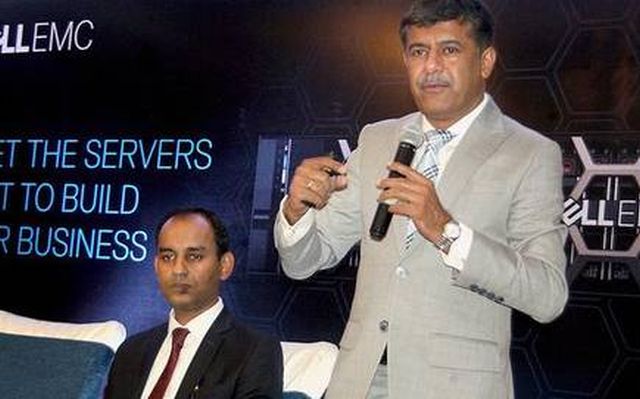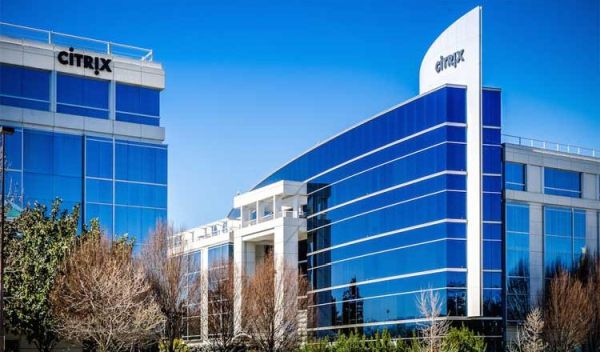
by admin | May 25, 2021 | Branding, Business, Corporate, Corporate Buzz, Large Enterprise, Markets, SMEs, Technology

Rajesh Janey
By Nishant Arora,
New Delhi : Cloud adoption is undoubtedly growing very fast in India — but the running costs, coupled with the desire to have data on premises with a Cloud-like feel, is also driving Indian enterprises towards owning a multi-Cloud experience, says Rajesh Janey, President and Managing Director, India Enterprise, Dell EMC.
The digital transformation journey that began with data storage for large Indian organisations has now resulted in a realisation that massive data-sets are not only critical from the storage perspective but also from the perspective of how to harness those and derive maximum growth.
“Cloud has shown a significant growth but when we look at the India scene, traditional IT infrastructure is still very big when compared to the overall Cloud spend.
“CEOs and CTOs who wanted ease, simplicity, agility and operational availability with Cloud are also looking at the same experience on premises. This is true mostly for those organisations with sustained, predictable workloads,” Janey told IANS.
“The enterprises are aiming for a Hybrid Cloud model — even better a multi-Cloud offering — where the same ease, simplicity, manageability, auto-provisioning and orchestration can be achieved right in their backyards that is associated with Cloud,” explained Janey, a long-time industry veteran.
At a time when data becomes the key and unlike video streaming or retail shopping where Cloud becomes necessary to make sense of the “bursty, unpredictable” data, organisations in India with sustained workloads are looking at vendors, asking hey, can I take my data where I sit?
“The new thought process among Indian CEOs and CTOs is: Can I bring data on-premise? Here, I see three clear trends for 2019: Data explosion, automation and a demand for Cloud-like infrastructure on-premise. Remember that Cloud is not a destination but a way of doing things in a certain way,” Janey told IANS.
In India, Dell EMC works with Chitale Dairy which is using an Internet of Thing (IoT) solution to help keep livestock healthy, and producing 10 times higher yield through big data analytics, automated farmer to-do lists and computerised breeding management.
Dell EMC “VxRail” (a hyper-converged appliance family) has successfully driven business growth for Truetzschler India Private Limited, a leading manufacturer and supplier of textile, carding and comber machinery.
Pune-based KPIT Technologies developed its IT infrastructure with Dell-EMC, which has, over time, helped them foster innovation and gain better control over their technology support system.
“What I witnessed in the later part of this year was that Indian enterprises now accept data is the key. Storing, managing, protecting and optimising data are now important conversations. In the past year or so, we have seen an era of leveraging data, deriving actionable and business intelligence (BI),” noted Janey.
Globally, in its third quarter for fiscal 2019, Dell Technologies reported revenues of $22.5 billion, up 15 per cent from the prior period.
Infrastructure Solutions Group revenue for the third quarter was $8.9 billion — a 19 per cent increase. This was driven by revenue of $3.9 billion in storage and $5.1 billion in servers and networking.
For Jeff Clarke, Vice Chairman, Products and Operations, Dell Technologies, data is becoming the most valuable and differentiating asset for many organisations as it opens up new revenue streams and unearths opportunities for improvement in almost every part within the organisation.
According to Janey, embedded in the data are disruptive technologies that are happening across the spectrum.
“Analysing data (via automation, Artificial Intelligence and Machine Learning), managing large storage and unpredictable growth — everything has come to the fore.
“Have we reached an age of actionable, data-based intelligence? In some way yes, especially in the consumer space — but a lot is yet to come,” said Janey.
“Clearly, storing and managing humongous data, protecting against its loss and misuse from cyber threats and optimising it for growth will drive innovation in Indian enterprises next year,” Janey emphasised.
(Nishant Arora can be contacted at nishant.a@ians.in)
—IANS

by admin | May 25, 2021 | Economy, Markets, Networking, News, Online Marketing, Technology
 New Delhi : A large-sized enterprise in India loses an average of $10.3 million owing to cyber attacks and a mid-sized organisation an average of $11,000 annually, a Microsoft-led study said on Wednesday.
New Delhi : A large-sized enterprise in India loses an average of $10.3 million owing to cyber attacks and a mid-sized organisation an average of $11,000 annually, a Microsoft-led study said on Wednesday.
Cyber security attacks have also resulted in job losses across different functions in more than three in five (64 per cent) organisations that have experienced cyber attacks, revealed the Frost and Sullivan study commissioned by Microsoft.
“With traditional IT boundaries disappearing, the adversaries now have many new targets to attack. Companies face the risk of significant financial loss, damage to customer satisfaction and market reputation-as is evident from high-profile breaches this year,” said Keshav Dhakad, Group Head and Assistant General Counsel, Corporate, External & Legal Affairs (CELA), Microsoft India.
The study, titled “Understanding the Cybersecurity Threat Landscape in Asia Pacific: Securing the Modern Enterprise in a Digital World” involved a survey of 1,300 business and IT decision makers.
“More than three in five organizations (62 per cent) surveyed in India have either experienced a cybersecurity incident (30 per cent) or are not sure if they had one as they have not performed proper forensics or data breach assessment (32 per cent),” the findings showed.
The survey ranged from mid-sized organisations (250 to 499 employees) to large-sised organizations (more than 500 employees).
To calculate the cost of cybercrime, Frost & Sullivan created an economic-loss model based on macro-economic data and insights shared by the survey respondents.
The study also examined the current cyber security strategy of organisations in India.
It found that nine in 10 (92 per cent) Indian organisations are looking to leverage Artificial Intelligence (AI) to enhance their cyber security strategy.
Additionally, more than one in five (22 per cent) of Indian organisations have witnessed benefits of using AI to achieve faster and more accurate detection of threats.
“Most organisations lack a cybersecurity strategy, while for a large majority cybersecurity was an afterthought. About 59 per cent (three in five) respondents said the fear of cyber attacks has hindered digital transformation projects,” the study noted.
While 37 per cent see cybersecurity strategy only as a means to safeguard the organisation against cyberattacks rather than a strategic business enabler, a mere 18 per cent seeing cybersecurity as a digital transformation enabler, it added.
—IANS

by admin | May 25, 2021 | Business, Commodity Market, Investing, Large Enterprise
 New Delhi : Only one in four large Indian enterprises is able to tap into the full potential of technology-enabled innovations, with most others missing out on an opportunity for both strong growth in profits and market capitalisation, an Accenture report said on Monday.
New Delhi : Only one in four large Indian enterprises is able to tap into the full potential of technology-enabled innovations, with most others missing out on an opportunity for both strong growth in profits and market capitalisation, an Accenture report said on Monday.
The report, titled “How to Unlock the Value of Your Innovation Investments”, surveyed C-level executives at 840 large companies across 14 industries and eight countries, including 106 large companies in India.
It found that approximately one in four (25 per cent) of Indian organisations surveyed are generating significant value from their innovation investments as it identified the innovation approach of these high-growth companies and what other companies can learn from them.
“Our research highlights that Indian companies apply innovation more comprehensively compared to their global counterparts.
“In fact, almost 90 per cent of Indian companies have plans to increase their innovation spending by more than 25 per cent over the next five years,” said Anindya Basu, Geographic Unit and Country Senior Managing Director, Accenture in India.
“However, 70 per cent of Indian companies are focusing their investments on incremental innovation, which limits their ability to derive tangible value from their investments,” Basu added.
The research found that companies’ return on innovation investments declined 27 per cent over the past five years.
The gap between what technology makes possible and the ability of companies to realise that value is only going to grow, it added.
Globally, incumbents and start-ups spent a combined $3.2 trillion on innovation-related activities over the past five years and this trend was expected to continue.
“Almost one-half (50 per cent) of those Accenture surveyed in India expect to increase their investments in innovation by more than 50 per cent over the next five years,” the report said.
Of the 75 per cent of Indian respondents who reported increasing their innovation investments by at least 25 per cent in the past five years, more than one-third (38 per cent) under-performed their industry peers in growing profits or market capitalisation.
“The analysis shows that much of this is due to spending predominantly on incremental innovation, which is how nearly three-fourths of non-high-growth Indian companies directed their spend, rather than on disruptive innovation,” said the report.
According to Basu, high-growth companies are not only investing aggressively, but also taking a distinct, disruptive approach to innovation to reinvent their businesses.
—IANS

by admin | May 25, 2021 | Business, Markets, Medium Enterprise, Networking, Technology
 By Nishant Arora,
By Nishant Arora,
New Delhi : As the European Union (EU) gets ready to implement the much-awaited General Data Protection Regulation (GDPR) to harmonise data privacy laws for its citizens from May 25, most of the Indian organisations are still grappling to comply with the stringent regulation.
Containing 99 articles and 173 recitals, GDPR has key requirements that directly impact the way organisations implement IT security, thus addressing the key security tenets of confidentiality, integrity and availability of data.
According to the latest forensic data analytics survey by Ernst & Young (EY), only 13 per cent of the Indian firms have a plan to comply with GDPR by May 25.
As India is not present in the list of countries approved for data portability and transfer, GDPR poses an extra challenge for domestic firms that operate in the EU.
“It is imperative for Indian firms to plan and continue their journey towards compliance even after May 25, to ensure continuity of business within the EU and avoid hefty penalties because of non-compliance,” Jaspreet Singh, Partner-Cyber Security, EY, told IANS.
For Ramesh Vantipalli, Director Systems Engineering, End User Computing, VMware India, the challenge for the Indian organisations facing the GDPR is ubiquitous data which will only increase exponentially in future.
“For Indian companies with operations in the EU, data security measures will now have to work alongside legal and compliance teams to ensure maximum adherence to GDPR,” Vantipalli told IANS.
“Fortunately, the transition will take place over some time and not overnight, giving Indian companies enough time to get their GDPR strategy in place,” he added.
With data privacy concerns on the rise and stringent regulatory requirements like GDPR coming into force, organisations have no choice but to redefine the way they approach data management.
“Organisations should realise that GDPR is about more than just data; it’s necessitating a new playbook for businesses to engage with people,” stressed Akshay Aggarwal, Director, Solution Specialist, Oracle India.
Non-compliance with GDPR can result in heavy fines and increased regulatory actions.
“Organisations that collect personal data must be able to prove that they consistently and reliably comply with GDPR privacy and security principles. We’re actively working with several Indian businesses in this regard,” Aggarwal told IANS.
A new study from IBM reveals that nearly 60 per cent of organisations surveyed are embracing the GDPR globally as an opportunity to improve privacy, security, data management or as catalyst for new business models, rather than simply a compliance issue or impediment.
GDPR is a fairly complex piece of legislation with far reaching impact not just within the EU but across the world.
“Indian companies operating in the EU will have to change the way they capture, process and use data of EU nationals. It is a complicated process involving in-depth understanding of privacy laws and policies,” said Prajit Nair, Director Sales-End User Computing, VMware India.
Technology alone cannot help organisations understand and transition to GDPR, but it will be a crucial enabler.
“Indian companies must put in place a comprehensive strategy involving legal, compliance and IT departments to ensure complete adherence to the GDPR laws, as well as a proactive plan to address breaches and leaks,” Nair told IANS.
In fact, the post-GDPR world will see a much closer integration of the law and technology as organisations work out their data protection strategies.
According to George Chang, Vice President-APAC of cyber-security firm Forcepoint, India’s Data Protection Law, when comes into effect, will sure have a major impact on business operations.
“Organisations in India need to place compliance and data security as a priority considering the cost for violating these privacy laws is about to get very expensive. GDPR can cost up to 20 million Euros or 4 per cent of annual turnover, whichever is higher, for intentional or negligent violations,” Chang informed.
“With those kinds of stakes, investing in compliance now is the only right move for a sustainable business model,” he added.
According to Richard Hogg, Global GDPR and Governance Offerings Evangelist, IBM, GDPR applies to all the personal data of any employee or customer who are in Europe.
“Whether they are citizens or temporary residences and live there, are just passing through an EU airport for 30 minutes. During this time, potentially GDPR applies to their personal data.
“GDPR really does have extra-territorial scope. Additionally, it can apply to anyone’s personal data, if you are actively marketing or profiling them From Europe, wherever they are in the world,” Hogg told IANS.
As the clock ticks down to the deadline to comply with the new GDPR regulations, the Indian firms need to enact strict data protection regulations.
“With strong data protection strategies in place, customers will place greater confidence in businesses, and businesses will minimise the financial fall-out of a breach,” Chang told IANS.
(Nishant Arora can be contacted at nishant.a@ians.in)
—IANS

by admin | May 25, 2021 | Business, Large Enterprise, Markets, Technology
 New Delhi : With a surge in the adoption of digital workspaces, the Indian enterprises will work towards harnessing opportunities created by integration of new technologies in 2018, desktop virtualisation leader Citrix said on Monday.
New Delhi : With a surge in the adoption of digital workspaces, the Indian enterprises will work towards harnessing opportunities created by integration of new technologies in 2018, desktop virtualisation leader Citrix said on Monday.
“Digital workspaces will help organisations across various facets of operation, ranging from talent retention in HR, productivity in operations, data-driven decisions in finance, improved customer engagement in sales and so on,” Makarand Joshi, Area Vice President and Country Head, India Subcontinent, Citrix, told IANS.
The workspace transformation is inevitable and the benefits far outweigh the transitional hurdles that might come up, he added.
According to Citrix, Cloud and cloud-enabled Software-as-a-service (SaaS) apps are here to stay.
“Capabilities around analytics, Artificial Intelligence (AI), robotics that have been integrated into Cloud-based offerings are proving hard to emulate using traditional on-premise deployments due to cost, complexity, and skill considerations,” Joshi said.
Businesses, therefore, will have to evaluate the capabilities of the Cloud offerings alongside on-premise offerings and accordingly implement an environment spread across Cloud platforms that best meets their capability and productivity goals.
As work paradigms and technologies change, we will see an even wider gap between generations.
“With 50 per cent of employees being digital natives who prefer not to be restrained by a location, and the rest comprising of traditional non-digital employees, organisations will have to invest in creating systems that regulate this gap,” Citrix added.
Organisations need to encourage adoption of digital technologies like automation, Internet-connected devices, and online communication tools, to reduce the technology awareness gap across groups.
“Hiring trends will also see a shift as the newer generations joining the workforce are increasingly mobile and technology savvy, it will be increasingly difficult to attract the best people in this talent pool without extending capabilities like mobile digital workplaces and Bring Your Own Device (BYOD),” Joshi emphasised.
—IANS





